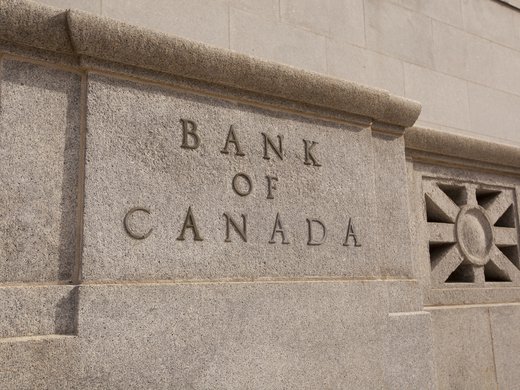The vaunted Canadian banking system has been shaken. It survived the test, but not without exposing some weaknesses.
A country that lost no banks during the 2008 financial crisis nearly lost one during the wee hours of Monday, May 1, when the Office of the Superintendent of Financial Institutions was on standby to take over Home Capital Group Inc., a Toronto-based lender of subprime mortgages that was experiencing a run on its deposits. At the eleventh hour, Home Capital managed to secure a $2 billion line of credit from a pension fund. The terms were onerous, but Home Capital was alive, as was Canada’s two-decades-long streak of avoiding bank failures.
No one has declared victory. Home Capital’s stock price has stabilized, but at a level that is 70 percent lower than at the start of the year. Still, the firm’s depositors have stopped running for the exits. The episode suggests Canada’s finance industry has a degree of willingness to take care of itself rather than wait for a government rescue. The six biggest banks extended a $2 billion backstop to one of Home Capital’s competitors to stop contagion. The asset-management arm of one of those banks tripled its holdings of Home Capital stock. The board of the troubled firm added respected veterans of Canada’s finance industry and pledged to find new managers and credit on more favourable terms.
This will be seen in Ottawa as evidence that Canada’s system works. “We have been very focused on this from day one,” Finance Minister Bill Morneau said at the recent Group of Seven (G7) meeting of finance ministers and central bankers in Italy. “From the beginning, we have seen this as a Home Capital issue as opposed to a broader issue.” In a separate interview, Bank of Canada Governor Stephen Poloz called the Home Capital situation “idiosyncratic,” implying there was no systemic risk.
These were the clearest statements from Ottawa on Home Capital, and they came almost two weeks after the company secured its emergency credit line. In the meantime, Canadian financial stocks declined and bets the dollar’s value would drop surged to record levels. On May 10, Moody’s Investors Service downgraded Canada’s six biggest banks, citing “elevated” house prices and the continued expansion of household debt to unprecedented levels. There wasn’t much new in Moody’s assessment, but it encouraged the sentiment that Home Capital could be for Canada what the collapse of Lehman Brothers was for the United States.
Home Capital doesn’t belong in the same sentence as Lehman Brothers. At the end of 2016, the company had on its books loans of about $26 billion, a sliver of the total mortgage market. But that didn’t seem to matter. The run on Home Capital had been triggered by allegations by the Ontario Securities Commission that the firm’s executives had misled investors over the severity of fraudulent mortgage applications. Canada’s financial press was on death watch, generating a stream of this-just-in reporting that invariably included a reference to the US housing collapse and the financial crisis. Short sellers were having a field day.
One of the lessons of the financial crisis is that global investors like to see that regulators are on the case. No one in Ottawa made a special effort to do that when Home Capital’s troubles began to spread. Initial comments came from faceless spokespeople. On May 1, Morneau said, “What I’ve seen over the last few days is proof the system is working as it should.” The finance minister addressed the issue in Parliament the next day, saying there was no link between Home Capital and the broader strains in Canada’s housing market. There were a smattering of media reports based on unnamed sources that said regulators were on top of the situation.
Authorities could have done more. While Ottawa correctly avoided overreacting, it failed to explain why it felt the Lehman comparisons were exaggerated. Morneau’s initial comments failed to inspire confidence. Benjamin Tal, an economist at CIBC World Markets, said he and others were being inundated with calls from international clients at the end of April and early May. Investors were worried about two things: a trade war with the United States, and Home Capital. “Somebody has to stand for Canada,” Tal wrote.
Tal said Poloz should have been the one to calm investors. There was a problem with that suggestion: it’s not Poloz’s job, and the current central bank governor isn’t one to freelance. Morneau stated clearly in October 2016 that financial stability would be his responsibility. On May 4, Poloz spoke in Mexico City. It would have been an excellent opportunity to send a message to international investors about Home Capital. Poloz let the opportunity pass. When he was asked about it, Poloz said he wouldn’t talk about a specific institution.
Something changed between Mexico City and the G7 meeting of finance ministers and central bankers in Italy, when Poloz relented and both the central bank chief and the finance minister addressed the travails of the mortgage lender.
Perhaps Ottawa simply was out of practice? The financial crisis was almost 10 years ago, and Jack Dorsey, the chief executive and co-founder of Twitter, was only 20 years old the last time Canada lost a bank, in 1996.
Whatever the reason, Canada’s authorities allowed the troubles of a small bank to become a bigger story than it needed to be. Ottawa chose to rely on its reputation for running one of the world’s soundest financial systems. The market reaction to Home Capital suggests global investors are starting to doubt whether that reputation continues to be deserved. In the future, they may need more convincing.



